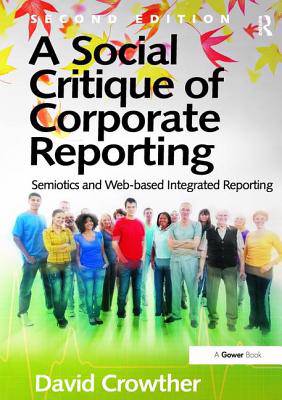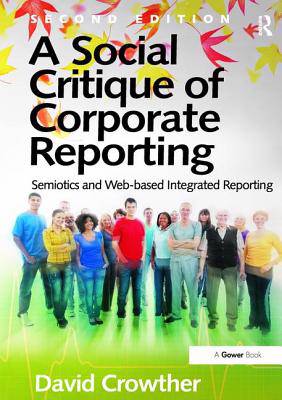
- Afhalen na 1 uur in een winkel met voorraad
- Gratis thuislevering in België vanaf € 30
- Ruim aanbod met 7 miljoen producten
- Afhalen na 1 uur in een winkel met voorraad
- Gratis thuislevering in België vanaf € 30
- Ruim aanbod met 7 miljoen producten
Zoeken
A Social Critique of Corporate Reporting
Semiotics and Web-Based Integrated Reporting
David Crowther
Paperback | Engels
€ 67,95
+ 135 punten
Uitvoering
Omschrijving
In the critically acclaimed first edition of A Social Critique of Corporate Reporting, David Crowther examined the perceived dialectic around traditional and environmental reporting to show it to be a false dialectic. Corporate reporting continues to change rapidly to incorporate more detail and especially environmental and social information. At the same time the mechanism for reporting has changed and the internet now enables more information to be provided to an ever wider range of stakeholders and interest groups. The perceived conflict between financial performance representing the needs of investors and other dimensions of performance representing the needs of other stakeholders still however continues to exist. In this updated edition, this perceived conflict is re-examined along with the wider purposes of corporate reporting. These are examined in the context of web based reporting and a greater concern for all stakeholders. The conclusion is that, although recent developments have produced changes, the essential conflict is still professed to exist, but remains a largely imaginary one. The analysis in this book makes use of both statistics and semiotics and in so doing develops a semiology of corporate reporting that offers an alternative to other research that is largely based on econometrics. Researchers, higher level students and others with an interest in or responsibility for corporate reporting, corporate social responsibility, accounting research, or semiotics will find this book essential reading.
Specificaties
Betrokkenen
- Auteur(s):
- Uitgeverij:
Inhoud
- Aantal bladzijden:
- 254
- Taal:
- Engels
Eigenschappen
- Productcode (EAN):
- 9781138271715
- Verschijningsdatum:
- 28/11/2016
- Uitvoering:
- Paperback
- Formaat:
- Trade paperback (VS)
- Afmetingen:
- 175 mm x 246 mm
- Gewicht:
- 452 g

Alleen bij Standaard Boekhandel
+ 135 punten op je klantenkaart van Standaard Boekhandel
Beoordelingen
We publiceren alleen reviews die voldoen aan de voorwaarden voor reviews. Bekijk onze voorwaarden voor reviews.











